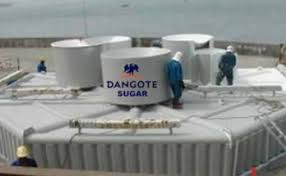There are no products in your shopping cart.
| 0 Items | £0.00 |


AFRICA'S richest man Alhaji Aliko Dangote has revealed that he remains confident that Nigeria can generate as much as $700m a tear in foreign exchange from the sale of sugar as long as the government sticks to its outlined policy.
Nigeria has introduced a backward integration policy in the sugar industry aimed at increasing domestic production, integrating output and reducing the dependence on imports. It involves encouraging local processors to invest in refineries, supporting sugarcane producers and placing high tariffs on imports.
Speaking at the 15th annual general meeting of the Dangote Group in Lagos yesterday, Alhaji Dangote said allowing distortions in the sugar masterplan framework could adversely affect the target of the nation attaining self-sufficiency as projected. He added that the backward integration policy is commendable as it will not only reduce imports of raw sugar but save the nations enormous foreign exchange used for importation.
Alhaji Dangote said: “The backward integration policy in the sugar industry is going on well and if the National Sugar Master Plan is followed strictly and the players all follow the rules, the country will be better for it as Nigeria will save between $600m and $700m annually as forex. Our growth continued to benefit from the sustained efforts to drive customer base expansion and several trade initiatives and investments.”
He disclosed that the backward integration policy was recording appreciable progress. Speaking on the performance of the company, he said that despite the disruptions in the economy occasioned by the Covid-19 pandemic, Dangote Sugar recorded an increase in production of 13.7%, producing 743,858 tonnes in the financial year that ended on December 31, 2020, compared with 654,071 tonnes in 2019.
According to Alhaji Dangote, turnover of N214.3bn was recorded in 2020, showing a 33% increase over the N161.1bn recorded in 2019. Profit after taxation increased by 33.2% to N26.70bn as against N22.36bn in 2019, leading the board of the company to declare a dividend payment of N18.22bn to the shareholders, amounting to 150 kobo per ordinary share of 50k each.